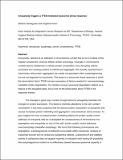Aneuploidy triggers a TFEB-mediated lysosomal stress response
Author(s)
Santaguida, Stefano; Amon, Angelika B
DownloadAmon2.pdf (1.436Mb)
OPEN_ACCESS_POLICY
Open Access Policy
Creative Commons Attribution-Noncommercial-Share Alike
Terms of use
Metadata
Show full item recordAbstract
Aneuploidy, defined as an alteration in chromosome number that is not a multiple of the haploid complement, severely affects cellular physiology. Changes in chromosome number lead to imbalances in cellular protein composition, thus disrupting cellular processes and causing proteins to misfold and aggregate. We recently reported that in mammalian cells protein aggregates are readily encapsulated within autophagosomes but are not degraded by lysosomes. This leads to a lysosomal stress response in which the transcription factor TFEB induces expression of factors needed for macroautophagy-mediated protein degradation. Our studies uncover lysosomal degradation defects as a feature of the aneuploid state, and a role for the transcription factor TFEB in the response thereto.
Keywords: aneuploidy; autophagy; cancer; proteotoxicity; TFEB
Date issued
2015-11Department
Massachusetts Institute of Technology. Department of Biology; Koch Institute for Integrative Cancer Research at MITJournal
Autophagy
Publisher
Taylor & Francis
Citation
Santaguida, Stefano and Angelika Amon. “Aneuploidy Triggers a TFEB-Mediated Lysosomal Stress Response.” Autophagy 11, 12 (November 2015): 2383–2384
Version: Author's final manuscript
ISSN
1554-8627
1554-8635